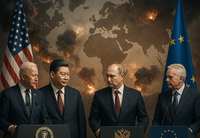Excess Meets Shortage – and No One Is Spared
In Central Europe, having breakfast with coffee and a croissant is a daily tradition. Meanwhile, 735 million people worldwide don't know if they'll have food tomorrow. One out of every thirteen people on this planet is starving – and this is happening in the 21st century!
Every 13 seconds, a child under five years old dies because of hunger. That's more than 6,600 children every day. In total, around 21,600 people die each day due to hunger or the direct effects of malnutrition.
World hunger is not just a humanitarian disaster – it poses a global risk. When entire regions suffer from hunger, the global balance is disrupted: economic crises, political instability, mass migration, and global security issues result. This affects not just "others" – it impacts our well-being, our security, and our future.
Hunger Has Causes – and Consequences for Everyone
🌍 Climate Crisis: Fueling Global Instability
Climate change is no longer a future threat – it's today's disaster. Droughts, floods, storms: natural forces destroy crops and livestock. The African continent is hit especially hard, with temperatures rising about 1.5 times faster than the global average.
Currently, 75% of all hungry people live in rural areas – where extreme weather ruins their sole livelihood: agriculture. According to the World Bank, up to 216 million people could become so-called climate refugees by 2050, many due to hunger.
These migrations and the struggle for scarce resources can destabilize entire regions. Crop failures often lead to state collapse, armed conflict, and waves of migration – with massive economic and security implications for the global community.
⚔️ War Makes People Hungry – and Hunger Breeds Conflict
Conflicts and wars are among the harshest drivers of hunger. When fields are left fallow, villages are destroyed, and supply chains are blocked, food security collapses entirely. In Syria, Sudan, and Yemen, millions suffer from malnutrition because war destroys both lives and food supplies.
The war in Ukraine has global repercussions: countries like Somalia, Ethiopia, and Niger, dependent on wheat imports, fall into deeper crises with disrupted supplies. When food becomes a geopolitical tool, we are affected economically and politically too.
The Vicious Cycle of Poverty – and Its Global Feedback
Poverty and hunger are two sides of the same coin. The poor cannot afford healthy food, invest little in education or health, and remain trapped in the cycle of poverty.
When natural disasters also destroy agriculture, these people lose not just their food but their entire economic existence. No income means no food – no food means no energy to work. This system breeds illness, fuels conflict, and destabilizes societies.
These unstable regions aren't just humanitarian crisis centers – they have worldwide repercussions: fluctuating raw material prices, unstable markets, uncontrolled migration, and political tensions. Our well-being depends on other societies remaining stable too.
Global Abundance – Yet a Worldwide Risk
Globally, we produce enough food to feed 10 billion people – yet nearly one in ten goes hungry. Why? Because resources are unevenly distributed, food is wasted, and agricultural land is used inefficiently.
🥩 Meat Consumes Food – and Land
Over a third of all global cropland is used for animal feed – not directly for people, but for livestock. This land is unavailable for growing human food – a luxury that may not hold up under geopolitical tensions.
🗑️ Food Waste: A Dangerous Neglect
Every year, 1.3 billion tons of food are thrown away – about a third of all produced food. While we waste tons of edible food, elsewhere entire economies collapse due to hunger. This waste is not just unethical – it's economically and politically dangerous.
What Can We Do? Responsibility Leads to Prevention
- Reduce meat consumption to increase efficiency in global food production.
- Stop food waste through better management and more conscious consumer behavior.
- Donate strategically – to organizations that strengthen local structures instead of just providing short-term fixes.
- Support climate protection to ensure long-term food security and geopolitical stability.
Conclusion: Hunger Destabilizes the World – and No One Is Spared
World hunger isn't an isolated problem. It's a breeding ground for instability, migration, economic shocks, and geopolitical tensions. If we do nothing, it will eventually threaten our well-being too.
Thinking globally today protects us tomorrow. Prevention is not just a moral duty – it's an economic and security necessity.





